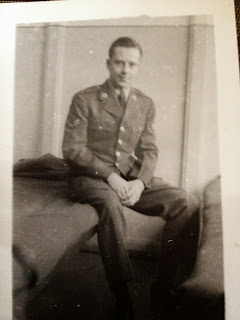A picture of my dad, who was in the United States Air Force from 1950 to 1954.
Today is Veterans Day. I remember when my grandparents called it Armistice Day. And that's what November 11 was, originally. The armistice ending World War One went into effect at 11:00 on 11/11/1918.
When the war, certainly one of the most unnecessary exercises of human blood-letting in history, ended, there was a horror at the prospect of ever fighting another armed conflict. The death and destruction had been enormous. War was unthinkable.
The League of Nations, the brainchild of U.S. President Woodrow Wilson, meant to help countries deal with their disputes peacefully, was established after the war. But, of course, the United States, sick of its one-year immersion in "power politics" (what Americans called foreign affairs in those days), wanted "normalcy," meaning the country desired to remain isolated from the world. Absent the involvement of the US, the League of Nations may have been doomed from the beginning. (World War One, for the other combatants, by the way, had lasted four years.)
In 1928, a treaty called the Kellogg-Briand Pact was promulgated. In it, nations promised to resolve their differences without going to war. A number of countries, including the United States, ratified the treaty. (The vote in the U.S. Senate was 85-1.)
But within five years, Hitler would be in power in Germany. His chancellorship ended any idealistic notions that human beings, by force of law, could prevent war. Given the aggression of Nazi Germany, Fascist Italy, and Imperial Japan, it's hard to see how World War Two could have been avoided. For the United States, any thought of remaining isolated from the war begun by those "Axis Powers" (or from tough, coercive peace-making efforts, for that matter) ended with the Japanese attack on Pearl Harbor on December 7, 1941.
I've talked in other places about the Lutheran understanding of the Bible's teaching on "the two kingdoms." It holds that God rules the world in two ways. Over His Church, He rules by grace. This is "the kingdom of the right," whose constituents have voluntarily surrendered to the Lordship of Jesus. They aren't perfect. But through "daily repentance and renewal," they seek to live in accordance with Jesus' great commandment: to love God and to love neighbor. They do so not through some coercion, but out of simple gratitude for having been saved by God's grace through faith in Christ.
But because not all people voluntarily live under God's gracious hand and seek instead, to be their own gods, God also rules through "the kingdom of the left." This is the kingdom of laws and armies and coercive power, the kingdom of wars.*
Absent this mode of rule, the world would be a far more inhospitable place than it is. God establishes governmental authority and power to do two things: (1) To keep human selfishness and sin in check; (2) To clear a place of sufficient calm that will allow people to hear His gospel of grace.
Human beings, being human though, will, of course, often give vent to their sinful human nature, turning their backs on the authority of God over their lives, whether they consider themselves citizens of the kingdom of the right or the kingdom of the left. Sin, death, and darkness remain in this world--and in each of us--until the day Jesus returns, the dead in Christ rise, and He fully establishes the new heaven and the new earth.
This means that while peace always remains a worthy goal, we will not always be successful in obtaining it.
Jesus once was describing the signs of the end of this world that He will bring about when He returns. He said that all of the signs of His return had already taken place and that we all should be prepared for the end. And He said: "When you hear of wars and rumors of wars, do not be alarmed. Such things must happen, but the end is still to come."
Wars are inevitable because we human beings are sinners.
But on this Veterans Day, as I consider all the warring that my country has engaged in just in my lifetime and all the wars around the world that have happened in that same period, it makes me heartsick. The Korean War had ended about five months before I was born. Since then, America's military has been asked to fight or face hostile fire, most notably, in Vietnam (and Laos and Cambodia), Iraq (twice), and Afghanistan.
Whether all these wars were unavoidable or necessary is a political question. And I have no intention of addressing that here.
What I am saying is that, as a Christian, I'm no peacenik. I don't think that Christians are necessarily called to be pacifists. According to the New Testament, unless a government asks us to act unjustly, we are duty bound to God to serve our government, as though serving God. And that includes assisting in the execution of those wars that the government deems necessary.
But, as I thank the veterans of the military, like my dad and my nephews, for their service to America, today, I also pray that our leaders and the leaders of other nations will be given the wisdom to avoid the use of war in disputes.
No one should be asked to spend their lives in wars that have no good purpose.
Just a few thoughts.
[*The "kingdom of the left" and the "kingdom of the right" have nothing to do with more modern terms for political philosophies. To speak today of people being on the left or the right is to borrow from terminology that originally came from nineteenth century France.]

No comments:
Post a Comment